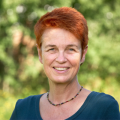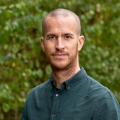Berlin / May 12, 2025 – Extreme weather events pose a threat to humanity, and yet anyone engaged in climate action is liable to face the US government's wrath. The 2025 Spring Meetings of the World Bank and International Monetary Fund in Washington, D.C., were marked by fear and uncertainty. One ray of hope: the German government decidedly opposed these trends and emphasized the importance of global cooperation. Urgewald also kept up the pressure during the World Bank Action Day and beyond. We also held important talks at the World Bank to exclude fossil fuels from trade finance and drove progress on the issues of transparency and accountability. Protecting people and nature is non-negotiable.
Packing our bags for D.C. was easy this time around. No T-shirts with the Urgewald slogan, no banners, no flyers for the World Bank Action Day were allowed. Above all, we wiped our cell phones and computers clean of any references to partner groups and actions. Although the three Urgewald colleagues who attended the Springs faced no unusual obstacles, our precautions were justified. The stories of random checks, sweeping government agency layoffs and the threat of philanthropy groups losing their tax-exempt status hung heavy in the air throughout our stay from April 20 to 27, 2025.
The World Bank and the International Monetary Fund are under pressure. The Trump administration is skeptical, even downright hostile toward the international cooperation associated with these two institutions. The US president's definitive position is expected in August. The World Bank has 189 member states, providing a forum for multilateral exchange that is unparalleled. A Trump-style break-up would be the wrong way to go. Even if we at Urgewald criticize the system's operations from a civil society perspective, we highlight problems and human rights violations in order to remedy them. The recent reform of the World Bank was a step in the right direction, albeit insufficient. We want German taxpayers' money to be put to good use and to actually contribute to ending extreme poverty and protecting global public goods such as forests, water, and soil.
Trade finance
One important task we had was to discuss critical issues relating to trade finance with the responsible employees of the International Finance Corporation (IFC) on site. In our latest research report, “Unequal Support,” we highlight, among other things, the lack of transparency and quality of publicly available data. We make concrete proposals on how IFC trade finance could contribute effectively to poverty reduction. It remains unclear to the public where the billions of dollars are going ($18.1 billion in 2024 alone). Investments in fossil fuel activities cannot be ruled out. After almost two years of campaigning, the IFC is opening up and engaging in direct dialogue with us. This is an important milestone in making the instrument fit for purpose in an unstable global situation.
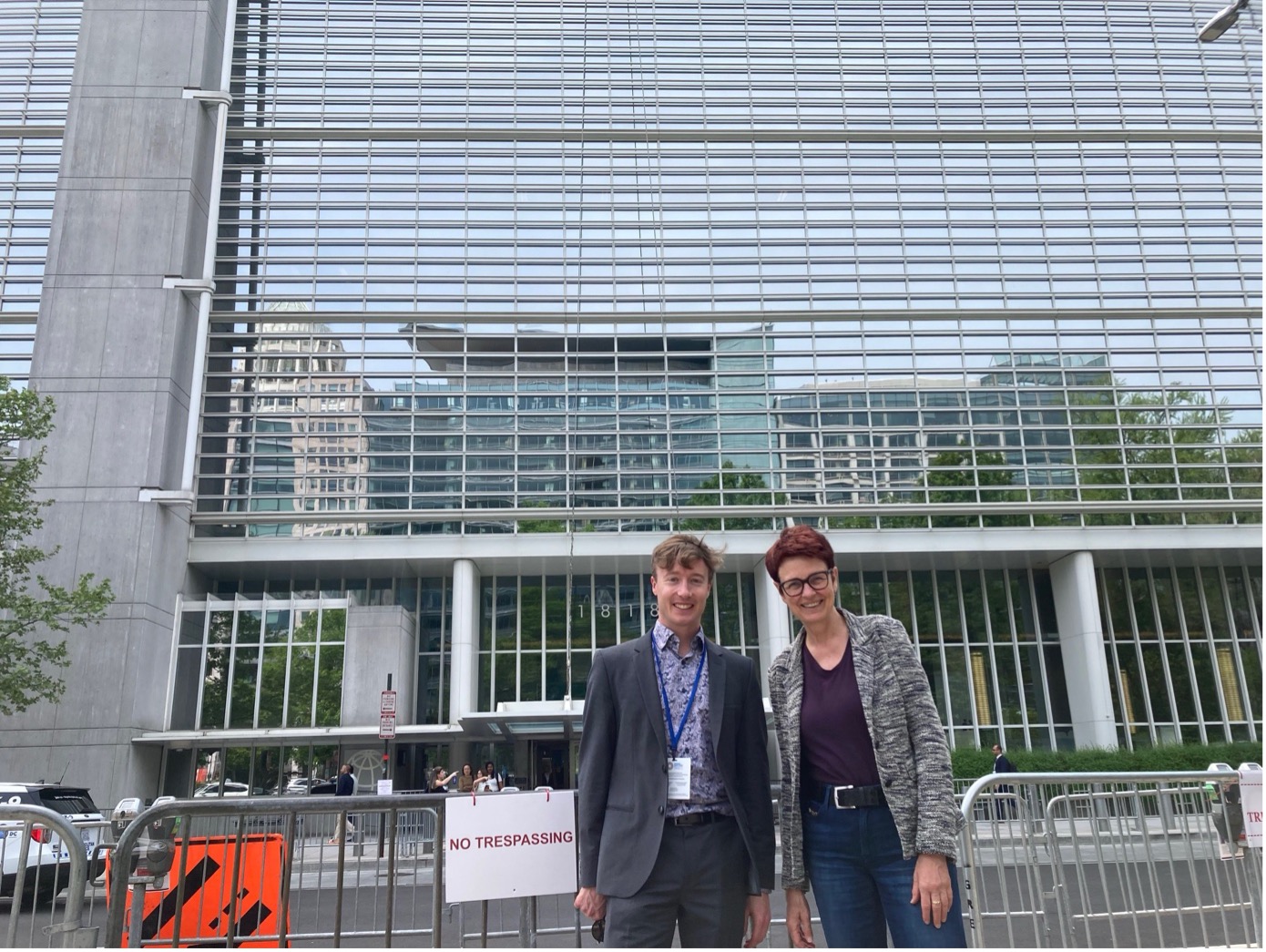
Photo: Jannis Perzlmeier and Ute Koczy in front of the World Bank building in Washington, D.C.
Complaint mechanisms
The instability in global politics also impacts the function of complaint mechanisms, as these represent a microcosm of geopolitical negotiation processes in multilateral forums.
Shortly before the Spring Meetings, after years of pressure from civil society organizations, the Board of Directors adopted the Remedy Framework. This framework describes for the first time how the IFC and MIGA must contribute to remedying the negative impacts of their investments. What should be taken for granted required a decade-long campaign, which makes it clear that the mandate to reduce poverty is still not fully reflected in the culture of the World Bank. Despite the framework's weaknesses, its introduction is an important signal to all multilateral banks: Those who cause harm must also provide redress.
Back in January 2025, the Supervisory Board had already agreed to our demands for significant structural reforms to the Inspection Panel. A few weeks later, we received news that Ajay Banga now wants to merge the two complaint mechanisms of the public (Inspection Panel) and private (Compliance Advisor Ombudsman) divisions. To ensure that this far-reaching reform does not weaken the complaints system, we have put forward concrete proposals on how the reform process should proceed and what objectives should be pursued. Representatives of the World Bank were downright shocked when we pointed out that the World Bank no longer held the “gold standard” in terms of complaints mechanisms. The road ahead will require serious effort and information disclosure. We took the willingness to return to the highest standards as a positive sign.
Civil society groups working to strengthen complaint mechanisms made a strong showing, and accountability to affected communities was high on the agenda. At a full-day event marking the 25th anniversary of the independent complaints mechanism CAO at American University, the history and successes of the CAO were reviewed. Urgewald was invited to contribute civil society perspectives and discussed future challenges and possible solutions with the heads of the two complaints mechanisms and the World Bank's chief legal officer, among others.
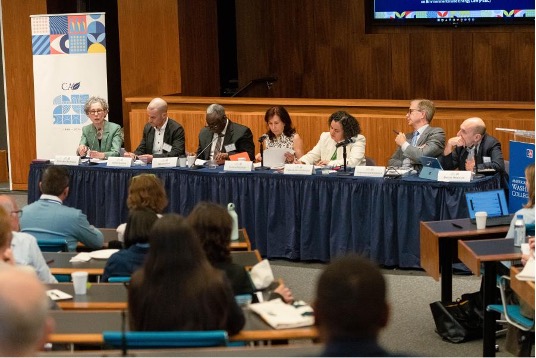
A livable planet is only possible with zero emissions
Our mission: remind the World Bank of its goal to “end poverty on a livable planet.” The World Bank has not fully closed the door on further financing for coal, oil, and gas; exclusion criteria are still lacking. Although 40 percent of all World Bank funds[1] are now supposed to go toward climate finance, Oxfam[2] and others have shown that these figures cannot be trusted. In addition, there are still enough shareholders, i.e. member states, that believe investments in gas offer advantages over renewable energies. The World Bank has set an ambitious goal for itself with Mission 300. According to this, over 300 million people in sub-Saharan Africa should finally have access to electricity by 2030. For groups such as Power Shift Africa, which organized a powerful event on this topic together with Big Shift Global and Recourse, realizing Mission 300 means putting the plan in the hands of local populations, forgiving debts, and excluding fossil fuels from any investments made towards the target.
World Bank Action Day: No compromises on climate protection!
To make our demands heard and give climate protection a loud voice in the public arena, we once again held the World Bank Action Day on Friday, April 25, 2025. together with activists from Washington, D.C., we gathered in front of the World Bank building. Speeches denounced runaway climate change, excessive debt, and the lack of action on it.
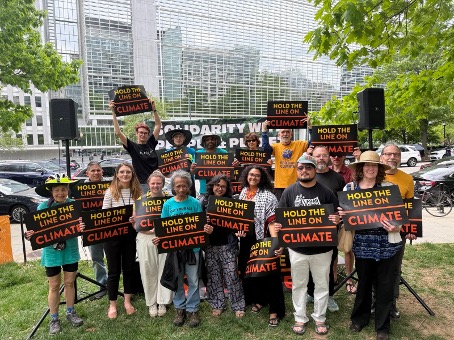
Photo: Protest in front of the World Bank
Last but not least, the World Bank is once again open to financing nuclear power. We at Urgewald believe this to be fundamentally wrong. We made our arguments against nuclear power clear in our discussions and in Ute's speech on the day of action. Investing even a single cent in risky nuclear technology is a waste of time and money.
Notes
